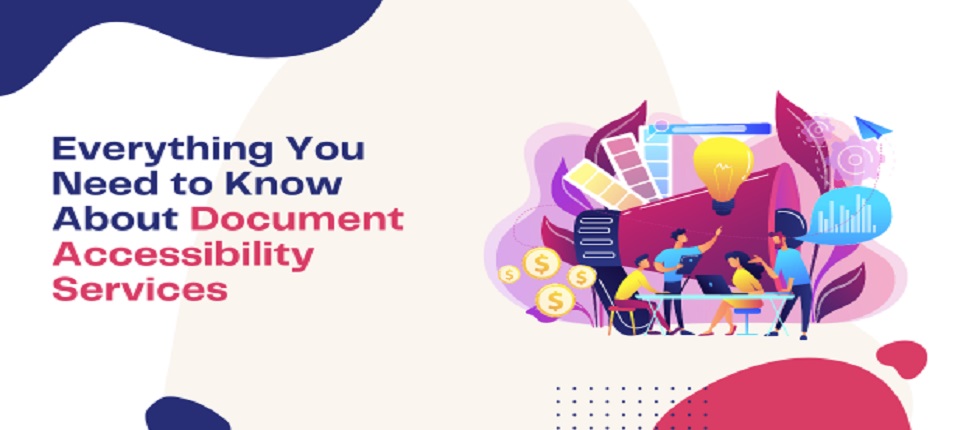Nowadays, it is crucial to ensure equal access to information for all individuals, regardless of their abilities. Document accessibility services are instrumental in making documents inclusive and usable for people with disabilities.
These services, including ADA document remediation and WCAG compliance, help organizations create accessible documents that adhere to legal requirements and promote inclusivity.
In this article, we will explore the key aspects of document accessibility services, why they are essential, and how they can benefit both businesses and individuals.
So, without wasting any time, let’s time.
Understanding Document Accessibility Services
In order to make electronic documents, such as PDFs, Word documents, and web material, accessible to individuals with impairments, a variety of techniques are used in document accessibility services.
The material in these documents should be accessible, understandable, and user-friendly for those with vision impairments, hearing impairments, cognitive disabilities, or movement impairments.
ADA Document Remediation is a vital aspect of document accessibility services. The Americans with Disabilities Act (ADA) requires organizations to make their digital documents accessible to individuals with disabilities.
ADA document remediation involves modifying existing documents to meet accessibility standards and guidelines. It may include adding alternative text for images, creating proper heading structures, and providing accessible navigation features.
Benefits of Document Accessibility Services
Now, let’s talk about the many benefits of the Document Accessibility Services:
Inclusive Content: Document accessibility services enable organizations to include people with disabilities in their target audience. By making documents accessible, businesses can ensure that everyone, regardless of their abilities, can access and benefit from the information they provide. This inclusivity creates a more equitable society and promotes equal opportunities for all individuals.
Legal Compliance: Investing in document accessibility services, such as ADA document remediation and WCAG compliance, helps organizations meet legal requirements. Failure to provide accessible documents can lead to legal repercussions, including potential lawsuits and financial penalties. By ensuring accessibility, businesses demonstrate their commitment to equal access and avoid legal complications.
Better User Experience: All users, not only those with disabilities, benefit from more positive user experiences thanks to accessible documents. Everyone can discover and understand the information offered more easily because of the clear navigation, appropriate header structures, and well-organized material. An improvement in user happiness and engagement results from this better user experience.
Improved Reach: Making documents accessible increases the reach of the content. When documents are accessible, they can be accessed and consumed by a broader audience, including individuals using assistive technologies like screen readers, screen magnifiers, and keyboard navigation. This expanded reach opens up new opportunities for businesses to connect with diverse audiences and maximize the impact of their information.
Enhanced Reputation and Brand Image: Demonstrating a commitment to accessibility can enhance an organization’s reputation and brand image. By prioritizing inclusivity, businesses show that they value diversity and strive to provide equal opportunities for all individuals. This positive reputation can attract more customers, foster customer loyalty, and differentiate the organization from competitors.
Choosing a Document Accessibility Service Provider
When selecting a document accessibility service provider, there are several important factors to consider. Making the right choice ensures that your organization receives high-quality services that meet your accessibility needs.
Here are some things that you should keep in mind during the selection process:
Experience: Look for a service provider with expertise in document accessibility, including ADA document remediation and WCAG compliance. Check their track record and experience in the field. An experienced provider will have a deep understanding of accessibility guidelines and standards and be well-versed in creating accessible documents.
Range of Services: Document accessibility goes beyond simple conversions. It involves various aspects, such as accessible PDF creation, alternative text descriptions, proper heading structures, color contrast adjustments, and more. Ensure that the service provider can address all your accessibility requirements.
Compliance with Accessibility Standards: Verify that the service provider is knowledgeable about the relevant accessibility standards, such as WCAG 2.1, Section 508, and ADA requirements. They should have a clear understanding of these guidelines and be able to create documents that comply with them. Compliance ensures that your documents are accessible to individuals with disabilities and conform to legal requirements.
Quality Assurance and Testing: Inquire about the provider’s quality assurance processes and testing procedures. Accessibility errors can hinder user experience and legal compliance. A reliable provider will have robust quality control measures in place to identify and rectify any accessibility issues before delivering the final documents.
Turnaround Time and Flexibility: Consider the provider’s turnaround time for completing projects. Accessibility needs may arise on short notice, so it’s essential to find a service provider who can accommodate urgent requests. Additionally, assess their flexibility in adapting to your specific needs and workflows. A provider who can work seamlessly with your organization’s processes will ensure a smoother collaboration.
Client Testimonials and References: Read client testimonials and seek references from other organizations that have worked with the service provider. Their feedback can give you insights into the provider’s reliability, professionalism, and customer service. It’s helpful to choose a provider with a proven track record of delivering high-quality accessible documents.
Accessibility Support and Training: Inquire about the service provider’s accessibility support and training options. Accessibility needs may evolve, and it’s valuable to have a partner who can assist you in understanding and implementing accessibility best practices. They should be able to offer guidance and resources to help your organization maintain accessibility standards in the long run.
Conclusion
Document accessibility services play a vital role in making information accessible to individuals with disabilities. ADA document remediation and WCAG compliance ensure that documents meet legal requirements and provide an inclusive user experience.
Investing in document accessibility services benefits both businesses and individuals by improving user experience, and expanding the reach of information.
Organizations can take the required actions to produce accessible documents and support a more inclusive digital world by selecting a reliable service provider. Accessibility is not just a legal necessity; it also shows how committed a company is to inclusive and equitable access for all.





